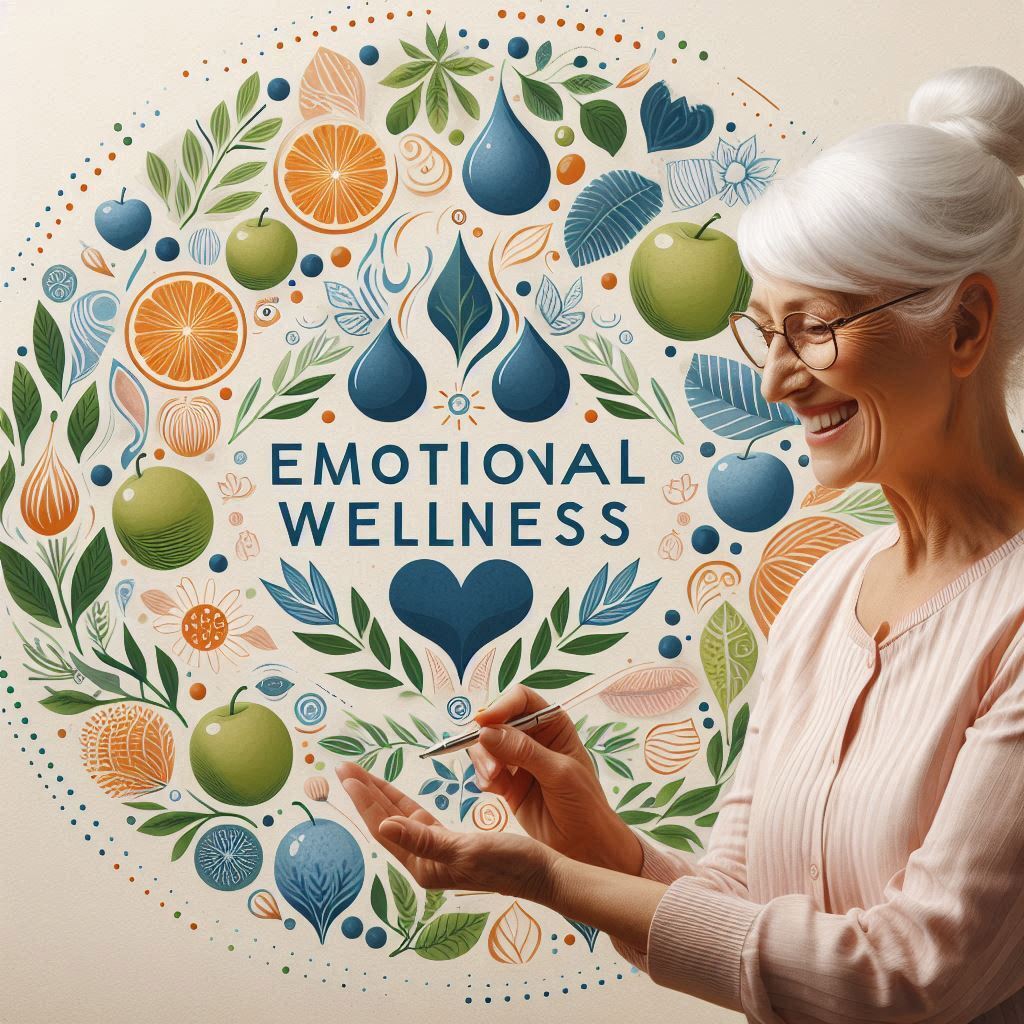Understanding Emotional Wellness
Tips For Seniors To Enhance Mental Health
Emotional wellness is about staying in tune with our feelings and adapting to life’s changes while maintaining a positive outlook. It’s essential for seniors as they navigate new stages of life, from retirement to physical changes. Emotional health can sometimes take a back seat, but keeping it in check is crucial as it impacts overall well-being.
Seniors face unique emotional challenges. Transitions like retirement can trigger feelings of loss or purposelessness, and changes in physical health can make anyone feel a bit down. Understanding these hurdles is the first step in managing them.
Ageing affects more than just our outer appearance. It also affects emotional health. Hormonal shifts, cognitive changes, and even how we process emotions can influence mental wellness. It’s not all doom and gloom—recognizing these changes helps find effective strategies. Focusing on emotional wellness opens doors to better health, happiness, and a more prosperous life.
Recognizing Signs of Emotional Distress
Spotting the signs of emotional distress in seniors isn’t always easy, but it’s vital to maintaining mental health. Look out for subtle hints like changes in mood or withdrawing from social activities. These signs can sometimes be mistaken for normal ageing, but being alert to them means getting help sooner.
Depressive symptoms and anxiety are shared among the elderly, and they can manifest in various ways. Feelings of sadness, hopelessness, or a loss of interest in once-loved activities could indicate depression. Anxiety might appear as excessive worry or restlessness. Understanding these signs means seniors can tackle them more effectively.
Cognitive changes are another piece of the puzzle. Seniors might experience memory lapses, confusion, or difficulty concentrating. While these are sometimes dismissed as “senior moments,” they can impact emotional wellness if not appropriately addressed. Recognizing them early supports better mental health management.
It’s crucial to know when to seek professional help. If emotional distress seriously interferes with daily life, reaching out to a healthcare provider is a must. They can offer guidance, treatment, and support tailored to individual needs. Keeping a check on emotional health ensures seniors maintain a balanced, happy life.
 Cultivating Connections: The Role of Social Support
Cultivating Connections: The Role of Social Support
A robust social network is like having a safety net for emotional well-being. Seniors often face loneliness, especially if family and friends are far away. Staying connected to others can boost mood and provide a sense of belonging that wards off feelings of isolation.
Isolation can damage mental health, so social interaction should be a priority. Community and family activities offer a chance to meet new people, share experiences, and strengthen existing bonds. Whether it’s a book club, hobby group, or family gathering, these interactions are gold for emotional wellness.
Volunteering opens doors to new friendships and offers a sense of purpose. Giving back to the community helps others and enriches personal well-being. Whether mentoring young folks or being involved in local charity, these activities provide fulfilment and stimulate seniors mentally.
Building a support network means having people to lean on when times get tough. It doesn’t have to be a vast group; a few trusted individuals who offer encouragement and understanding can make all the difference. Emotional health thrives on feeling connected and supported, creating a more resilient and happy life.
Mindful Practices for Emotional Stability
Mindful practices bring calm and clarity to life’s chaos. Introducing simple techniques like mindful breathing and meditation can help seniors find a peaceful state of mind. Just a few minutes daily focusing on breathing and letting go of stress can make a big difference.
Journaling offers a way to express feelings and reflect on life’s ups and downs. Writing doesn’t have to be perfect—it’s about getting thoughts on paper and finding insight through reflection. This practice tracks emotional states and helps us understand our reactions and feelings over time.
Integrating gratitude into daily routines can transform perspectives. Recognizing the good, whether through a gratitude journal or mental notes, shifts attention from negatives to positives, fostering a happier mindset.
Adaptive thinking and resilience serve as anchors during tumultuous times. Embracing change and viewing challenges as opportunities for growth encourages a proactive and positive approach to emotional health. Building resilience means facing life’s hurdles with grace and optimism.
 Nutritional and Physical Well-being in Emotional Health
Nutritional and Physical Well-being in Emotional Health
Our diet and physical activity play a vital role in maintaining emotional wellness. Eating right isn’t just about physical health; it keeps our minds sharp and moods stable. Simple dietary changes, like adding more fruits, veggies, and whole grains, can lift spirits and energy levels.
Exercise is more than just a physical activity—it’s a mood booster. Regular physical activity releases endorphins, making us feel happier and more relaxed. It doesn’t have to be intense; even a daily walk or gentle yoga can be enough to maintain emotional balance.
Sometimes, nutritional supplements can help bridge dietary gaps and support mental health. Vitamins like B12 and Omega-3s have been linked to better mood and cognitive function. Before starting any new supplements, it’s a good idea to talk to a healthcare professional to ensure they fit your needs.
Balancing rest with activity is crucial. Overexertion can lead to burnout, while too much inactivity can affect our mood. Finding the right mix keeps the body refreshed and the mind engaged, helping maintain a healthy emotional state.
Embracing New Hobbies and Lifelong Learning
New hobbies breathe life into everyday routines, giving seniors something fresh to look forward to and trying something new, whether painting, gardening, or even tackling puzzles, can stimulate the mind and revitalize the spirit.
Purposeful engagement through activities not only combats boredom but also builds confidence. Discovering and nurturing talents uncovers hidden skills, offering satisfaction and joy regardless of age.
Exploring creative outlets like art, music, and recreation ignites a passion that nurtures emotional health. Creativity isn’t limited by age. The joy of creation is a powerful antidote to stress and can improve mental focus and cognition.
Learning new skills provides a cognitive workout that keeps minds sharp and agile. Whether picking up a new language or exploring technology, lifelong learning maintains mental acuity and provides a sense of achievement.
Staying curious and open to change ensures seniors remain engaged in a constantly evolving world. Embracing change keeps the mind flexible and fosters a mindset of continuous growth and adventure, ensuring a vibrant and joyful life journey.


